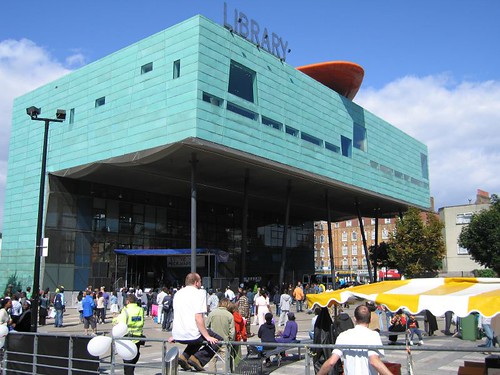Voices: Black women are under attack. This is why there’s uproar following the Peckham shop ‘assault’
Peckham #Peckham

Protests have broken out after a video showed a Black woman accused of theft being forcefully restrained in a Peckham beauty supply shop. At one point, the man can be seen putting his hands around the woman’s neck. We don’t yet know what may or may not have happened prior to this – but to me there is no excuse. That use of force seems totally unacceptable.
Why the outcry? As ever, context is important. The demonstrations that quickly came about after the incident show, in my opinion, the anger over the violence meted out to Black women on a daily basis.
It was US civil rights leader Malcolm X who said during a 1962 conference that “the most disrespected group in America is Black woman”.
Well: Black women around the world are routinely maligned, disrespected, and under-protected.
There’s no shortage of examples across the UK to back this up – a great deal of my recent reporting has highlighted extraordinary cases of violence against us; such as the incident in May, when a 90-year-old Black woman with dementia was handcuffed and put into a spit hood. Then, last month, Serlina Boyd – the CEO of Cocoa, Britain’s first major title for Black children – revealed that her car tyres were slashed in an alleged racist attack near her home.
(Screenshot)
The Independent recently revealed that Black women are twice as likely to be a victim of cyber flashing compared to their white counterparts, according to a landmark study that received very little media coverage.
I also reported on the systemic failings of state agencies that contributed to the death of Aisha Cleary, a Black baby whose “extremely vulnerable” teenage mother gave birth alone in her prison cell.
Then, there was the shocking story of the grandmother whose finger was bitten off in a dog attack in May. Her family have accused West Midlands Police of failing to take the matter seriously after they told her the animal was “friendly” and led a botched investigation into what happened. Annette Tonyin’s life was catastrophically changed, yet few people batted an eyelid. Now, the issue of dangerous dogs has become a national discussion.
There are countless other incidents: in April, The Independent revealed that Aldi had launched an investigation into claims of racial profiling after a Black female customer was mistakenly accused of theft at one of its stores. At around the same time, Ngozi Fulani was forced to step down as CEO of Sistah Space over a wave of online abuse in the wake of the Buckingham Palace racism incident.
More? Well, in February a Black schoolgirl, 15, was beaten by a gang of white people – kids and adults – in Kent as a crowd looked on, sparking a protest the following day. Meanwhile, Dr Shola Mos Shogbamimu, a prominent Black lawyer and activist, received death threats in a chilling letter from someone claiming to be affiliated with a Neo-Nazi terror group.
So no, this Peckham protest, while shocking, doesn’t come as a surprise.It can be a minefield navigating hair supply shops, trying to secure oils and extensions – as I can personally attest… which is why I have long boycotted certain branches and opted to create my own body lotions using raw ingredients at home.
Yes, I can exhale and peacefully use the products I’ve procured without having to deal with racist microaggressions, or cringing as I’m forced to walk past shelves of skin-whitening creams and relaxers containing corrosive chemicals. I don’t have to put up with the discomfort of being followed around as though I have some sort of predisposition to put items in my bag without paying for them.
This doesn’t happen in every store, but it does happen. Too often. Check out the online conversations and you’ll see. As my grandad used to say: “so many people can’t be wrong”.
Pointing out the well-documented issue of anti-Blackness in these spaces, and among other marginalised groups, isn’t rallying against others. On the contrary: true progress is built through honest discourse.
Some of the recent discourse has included cries for more people to support Black-owned businesses – not a bad thing. We should all be able to factor this into our spending practices, without being accused of being “divisive” or “bigoted”. Why shouldn’t Black people, and others, support Black businesses? “Shopping from Black-owned businesses is a vote for equality with our wallets,” as Khalia Ismain once wrote.
This is a matter of economic justice. Black women in the UK account for 10 per cent of haircare spend, although they make up only 2 per cent of the UK population, according to a 22 report by Treasure Tress. Black women also spend £168m annually on hair products in stores that are statistically less likely to be Black-owned. Why? Because of economic inequalities and imbalances affecting Black entrepreneurs in the UK, such as an increased likelihood of being refused bank loans.
The past 48 hours have given rise to some important conversations about Black experiences in Britain. We ignore them at our peril.